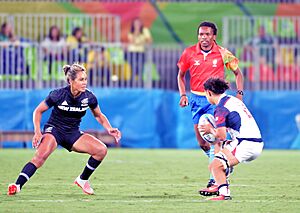Rugby sevens at the Summer Olympics facts for kids
Rugby sevens is a fast-paced team sport, a bit like regular rugby but with fewer players. It was played at the Summer Olympics for the very first time at the 2016 Summer Olympics in Rio de Janeiro. Both men's and women's teams competed in exciting tournaments.
The decision to add rugby sevens to the Olympics was made in 2009. In 2016, the first champions were Fiji for the men's tournament and Australia for the women's tournament. Before 2016, a different version of rugby with 15 players was played in the Olympics, but that stopped after 1924.
Contents
How Rugby Sevens Joined the Olympics
Trying for the Olympics: Early Attempts
People tried for a long time to get rugby sevens into the Olympics. Back in 1932, a man named W. Hastie Cochrane tried to get it into the Los Angeles Olympics, but it didn't happen. Other sports had already been chosen.
Later, in 2005, rugby sevens was one of five sports hoping to be included in the 2012 Summer Olympics. However, the Olympic committee decided not to add any new sports unless others were removed. In the end, two other sports, squash and karate, were chosen as possible additions instead of rugby.
Success for 2016!
The biggest push for rugby sevens came when it competed with golf for two spots in the 2016 Summer Olympics. The final decision was made in October 2009. The International Rugby Board (IRB), which runs rugby worldwide, worked hard to convince the Olympic committee.
They invited important Olympic delegates to the 2009 Rugby World Cup Sevens in Dubai. This event was a huge success, with 78,000 fans watching Wales win the men's title and Australia win the first-ever women's World Cup.
Famous rugby players like Jonah Lomu, Lawrence Dallaglio, and Waisale Serevi became ambassadors to help promote the sport. To make the Olympics the most important event for rugby sevens, the IRB even decided to stop holding their own Rugby World Cup Sevens.
In August 2009, the Olympic committee suggested that rugby sevens should be included. Then, on October 9, 2009, the full committee voted to add rugby sevens to the 2016 Games! This was a big win for the sport. Separate competitions for men and women were planned, similar to the existing World Rugby Sevens Series.
How Teams Qualify for the Olympics
Only twelve teams can play in both the men's and women's rugby sevens tournaments at the Olympics. Teams can qualify in a few ways:
- The country hosting the Olympics automatically gets a spot.
- The top four teams from the World Rugby Sevens Series (a big international competition) qualify.
- Six teams qualify by winning their championships in different parts of the world (like Europe, Africa, Asia, etc.).
- The last spot goes to the team that wins a special tournament for teams from different continents.
How the Competition Works
The Olympic rugby sevens competition has two main parts: pool play and knockout rounds.
For pool play, the twelve teams are split into three groups of four teams. Each team plays against the other three teams in their group once.
After pool play, the best eight teams move on to the knockout rounds. These include the top two teams from each group, plus the two best third-place teams. The other four teams play in a smaller competition for lower rankings.
The knockout rounds start with quarterfinals, then semifinals, and finally the big final.
- The winners of the quarterfinals go to the medal semifinals.
- The teams that lose in the quarterfinals play in another consolation bracket.
- The team that wins the final gets the gold medal.
- The team that loses the final gets the silver medal.
- The two teams that lose in the semifinals play each other to decide who wins the bronze medal.
History of Rugby Sevens at the Olympics
2016 Summer Olympics
Even though rugby hadn't been in the Olympics since 1924, the seven-a-side version was chosen for 2016. Rugby sevens is perfect for big events like the Olympics because games are short (14 minutes), and many matches can be played in one stadium over just two or three days. The sport was so popular that it was kept for the 2020 Summer Olympics and will be played in 2024 and 2028 too. It's also expected to be in 2032 in Australia, a country that loves rugby sevens!
The 2016 rugby competition took place in a special temporary stadium called Deodoro Stadium in Rio.
The competition ran from August 6 to 11. In the men's tournament, teams like Fiji, South Africa, and New Zealand competed. In the women's tournament, teams like Australia, New Zealand, and Canada were among the competitors.
The women's final was a thrilling match where Australia beat New Zealand 24–17. New Zealand started strong, but Australia fought back with amazing tries from players like Emma Tonegato, Evania Pelite, Ellia Green, and Charlotte Caslick.
In the men's tournament, Fiji made history by winning their country's first-ever Olympic medal! They won the gold medal with a huge 43–7 victory over Great Britain. South Africa won the bronze medal. Fiji's win was celebrated all over the world and was a highlight of the Games.
Future Olympic Games
Rugby sevens was also part of the 2020 Summer Olympics in Tokyo and will be featured in the 2024 Summer Olympics in Paris.
Men's Tournaments: Winners and Medals
Summary of Men's Tournaments
| Year | Host City | Final Match | Bronze Medal Match | ||||||
|---|---|---|---|---|---|---|---|---|---|
| Gold Medal | Score | Silver Medal | Bronze Medal | Score | Fourth Place | ||||
| 2016 | Rio de Janeiro |
Fiji |
43–7 | Great Britain |
South Africa |
54–14 | Japan |
||
| 2020 | Tokyo |
Fiji |
27–12 | New Zealand |
Argentina |
17–12 | Great Britain |
||
| 2024 | Paris |
– | – | ||||||
Men's Medal Table
| Rank | Nation | Gold | Silver | Bronze | Total |
|---|---|---|---|---|---|
| 1 | 2 | 0 | 0 | 2 | |
| 2 | 0 | 1 | 0 | 1 | |
| 0 | 1 | 0 | 1 | ||
| 4 | 0 | 0 | 1 | 1 | |
| 0 | 0 | 1 | 1 | ||
| Totals (5 entries) | 2 | 2 | 2 | 6 | |
Men's Participating Nations
- Legend
- 1st – Champions (Gold Medal)
- 2nd – Runners-up (Silver Medal)
- 3rd – Third place (Bronze Medal)
- 4th – Fourth place
- • – Did not enter / Did not qualify / Banned
- – Hosts (The country hosting the Olympics)
- Q – Qualified for the next tournament
| Nation | 2016 |
2020 |
2024 |
Years Played |
|---|---|---|---|---|
| 6th | 3rd | Q | 3 | |
| 8th | 7th | Q | 3 | |
| 12th | • | 1 | ||
| • | 8th | 1 | ||
| 1st | 1st | Q | 3 | |
| 7th | • | Q | 2 | |
| 2nd | 4th | 2 | ||
| • | 10th | Q | 2 | |
| 4th | 11th | Q | 3 | |
| 11th | 9th | Q | 3 | |
| 5th | 2nd | Q | 3 | |
| • | • | Q | 1 | |
| 3rd | 5th | 2 | ||
| • | 12th | • | 1 | |
| 10th | • | 1 | ||
| 9th | 6th | Q | 3 | |
| • | • | Q | 1 | |
| Total | 12 | 12 | 12 |
Women's Tournaments: Winners and Medals
Summary of Women's Tournaments
| Year | Host City | Final Match | Bronze Medal Match | ||||||
|---|---|---|---|---|---|---|---|---|---|
| Gold Medal | Score | Silver Medal | Bronze Medal | Score | Fourth Place | ||||
| 2016 | Rio de Janeiro |
Australia |
24–17 | New Zealand |
Canada |
33–10 | Great Britain |
||
| 2020 | Tokyo |
New Zealand |
26–12 | France |
Fiji |
21–12 | Great Britain |
||
| 2024 | Paris |
– | – | ||||||
Women's Medal Table
| Rank | Nation | Gold | Silver | Bronze | Total |
|---|---|---|---|---|---|
| 1 | 1 | 1 | 0 | 2 | |
| 2 | 1 | 0 | 0 | 1 | |
| 3 | 0 | 1 | 0 | 1 | |
| 4 | 0 | 0 | 1 | 1 | |
| 0 | 0 | 1 | 1 | ||
| Totals (5 entries) | 2 | 2 | 2 | 6 | |
Women's Participating Nations
- Legend
- 1st – Champions (Gold Medal)
- 2nd – Runners-up (Silver Medal)
- 3rd – Third place (Bronze Medal)
- 4th – Fourth place
- • – Did not enter / Did not qualify / Banned
- – Hosts (The country hosting the Olympics)
- Q – Qualified for the next tournament
| Nation | 2016 |
2020 |
2024 |
Years Played |
|---|---|---|---|---|
| 1st | 5th | Q | 3 | |
| 9th | 11th | Q | 3 | |
| 3rd | 9th | Q | 3 | |
| • | 7th | 1 | ||
| 12th | • | • | 1 | |
| 8th | 3rd | Q | 3 | |
| 6th | 2nd | Q | 3 | |
| 4th | 4th | Q | 3 | |
| • | • | Q | 1 | |
| 10th | 12th | Q | 3 | |
| 11th | 10th | 2 | ||
| 2nd | 1st | Q | 3 | |
| • | 8th | • | 1 | |
| • | • | Q | 1 | |
| 7th | • | • | 1 | |
| 5th | 6th | Q | 3 | |
| Total | 12 | 12 | 12 |
Combined Medal Table
This table shows all the medals won in both men's and women's rugby sevens tournaments up to the 2020 Olympics.
| Rank | Nation | Gold | Silver | Bronze | Total |
|---|---|---|---|---|---|
| 1 | 2 | 0 | 1 | 3 | |
| 2 | 1 | 2 | 0 | 3 | |
| 3 | 1 | 0 | 0 | 1 | |
| 4 | 0 | 1 | 0 | 1 | |
| 0 | 1 | 0 | 1 | ||
| 6 | 0 | 0 | 1 | 1 | |
| 0 | 0 | 1 | 1 | ||
| 0 | 0 | 1 | 1 | ||
| Totals (8 entries) | 4 | 4 | 4 | 12 | |
See also
 In Spanish: Rugby 7 en los Juegos Olímpicos para niños
In Spanish: Rugby 7 en los Juegos Olímpicos para niños
 | Madam C. J. Walker |
 | Janet Emerson Bashen |
 | Annie Turnbo Malone |
 | Maggie L. Walker |



